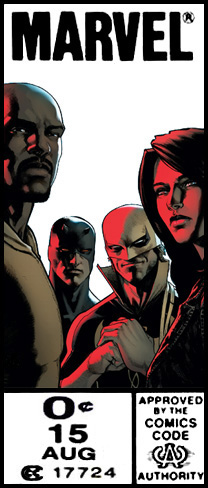

Stan Lee, Bill Everett, Brian Bendis, Michael Gaydos, Archie Goodwin, George Tuska, Roy Thomas, John Romita Sr., Gil Kane, [Frank Miller], Douglas Petrie, and Marco Ramirez, 2017
There are a whole lot of comic book creators formally credited for this series, but the one the showrunners are clearly inspired by is not Roy Thomas, who created the Defenders, but Brian Bendis. This is one of those Guardians of the Galaxy deals in which a name with some history behind it has been applied to a recently assembled group of characters rather than to those who had established that history in the first place. The core Defenders from their first appearance in 1971 up into the 1980s were Doctor Strange, Namor the Sub-Mariner, and the Hulk. The Silver Surfer often gets classed together with those three to make it a core quartet. And while the gimmick behind the Defenders was that they weren’t actually a formal team—anyone who happened to show up to deal with a given crisis was a Defender for the day—a handful of characters became Defenders mainstays even if they didn’t bring much star power to the table: foremost among these were the Valkyrie, Nighthawk, and Hellcat, while the Gargoyle and the Son of Satan earned their way into the corner box a fair number of times as well. The TV version of the team includes none of those characters. The closest we get is that Patsy Walker puts in a little face time, but she goes by “Trish” and shows no signs of putting on a kittycat suit any time soon. Instead, who makes the cut? Daredevil, written by Brian Bendis from 2001 to 2006; Jessica Jones, written by Brian Bendis from 2001 to 2006; Jessica Jones’s husband Luke Cage, Brian Bendis’s pet character who followed Bendis from book to book for the better part of two decades; and Luke Cage’s best friend, Iron Fist. So this is not an adaptation of the Defenders comic. It is an adaptation of the Power Man and Iron Fist comic—we even have both Daughters of the Dragon in important supporting roles—with special guest star Daredevil. If Marvel wanted to repurpose one of their existing team names for this group, they could just as easily have gone with the Champions or the Thunderbolts or the New Warriors or fuckin’ Power Pack. For that matter, it just occurred to me: there already was a team that included Luke Cage, Iron Fist, Jessica Jones, and Daredevil. It was the New Avengers, circa 2012. The writer of that series that year? No prizes for correctly guessing Brian Bendis.
Anyway, the idea here is that if you’ve been watching Daredevil, Jessica Jones, Luke Cage, and Iron Fist, here they are with all their series crammed together, supporting casts and all. Daredevil and Iron Fist take center stage a bit more than the other two, since the baddies are the shadowy cabal of necromancers known as the Hand, who had already served as the primary antagonists of Daredevil’s second season and Iron Fist’s first. With only eight episodes clocking in at about fifty minutes each, there isn’t time for much more than this one arc, with all the punching and kicking and stabbing it entails, but we do at least see the four protagonists get clarified through group dynamics. And it quickly becomes clear that this pocket of the Marvel Cinematic Universe has left the pre-MCU comics behind. Jessica Jones does more or less what she did in Bendis’s team books—stand off to the side and mutter about how she doesn’t want to be there—but in the MCU pairing of Power Man and Iron Fist, Luke Cage is the self-effacing voice of reason and Danny Rand is the irascible hothead. Daredevil, meanwhile, comes off as a weaselly, sadomasochistic martyr. His comics have made a marked migration in that direction over the past few years and these Netflix shows make it clear where that came from. But I dunno—do people really want to watch that? My understanding is that the cancellation of The Defenders and its feeder shows had more to do with corporate politics than ratings, with Disney wanting to bring its properties onto its own streaming service, but I have to think that if these shows were smashing successes, the powers that be would have found a way to make them run a little longer. I went looking for ratings information and found an article suggesting that The Defenders was a flop, though the author cautions that this conclusion is based on third-party estimates. The article begins, “Netflix is notorious for the secrecy it shrouds its viewership numbers in. Seriously, you have a better chance at discovering the nuclear launch codes than digging up official ratings for a Netflix original.” So maybe the audience stats are also just sitting in a box at Mar‑a‑Lago?
 |
 |
 |
 |
||
|---|---|---|---|---|---|
Tumblr |
this site |
Calendar page |
|||